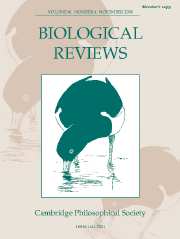Article contents
Are ecological and evolutionary theories scientific?
Published online by Cambridge University Press: 17 May 2001
Abstract
Scientists observe nature, search for generalizations, and provide explanations for why the world is as it is. Generalizations are of two kinds. The first are descriptive and inductive, such as Boyle's Law. They are derived from observations and therefore refer to observables (in this case, pressure and volume). The second are often imaginative and form the axioms of a deductive theory, such as Newton's Laws of Motion. They often refer to unobservables (e.g. inertia and gravitation). Biology has many inductive generalizations (e.g. Bergmann's Rule and ‘all cells arise from preexisting cells’) but few, if any, recognized universal laws and virtually no deductive theory. Many biologists and philosophers of biology have agreed that predictive theory is inappropriate in biology, which is said to be more complex than physics, and that one can have nonpredictive explanations, such as the neo-Darwinian Theory of Evolution by Natural Selection. Other philosophers dismiss nonpredictive, explanatory theories, including evolutionary ‘theory’, as metaphysics. Most biologists do not think of themselves as philosophers or give much thought to the philosophical basis of their research. Nevertheless, their philosophy shows in the way they do research. The plethora of ad hoc (i.e. not universal) hypotheses indicates that biologists are reluctant inductivists in that the search for generalization does not have a high priority. Biologists test their hypotheses by verification. Theoretical physicists, in contrast, are deductive unifiers and test their explanatory hypotheses by falsification.
I argue that theoretical biology (concerned with unobservables, such as fitness and natural selection) is not scientific because it lacks universal laws and predictive theory. In order to make this argument, I review the differences between verificationism and falsificationism, induction and deduction, and descriptive and explanatory laws. I show how these differ with a specific example of a successful and still useful (even if now superseded as explanatory) deductive theory, Newton's Theory of Motion. I also review some of the philosophical views expressed on these topics because philosophers seem to be even more divided than biologists, which is not at all helpful.
The fact that biology does not have predictive theories does not constitute irrefutable evidence that it cannot have them. The only way to falsify this philosophical hypothesis, however, is to produce a predictive theory with universal biological laws. I have proposed such a theory, but it has been presented piecemeal. At the end of this paper, I bring the pieces together into a deductive theory on the evolution of life history traits (e.g. clutch size, mating relationships, sexual size dimorphism).
Keywords
- Type
- Review Article
- Information
- Copyright
- Cambridge Philosophical Society 2001
- 43
- Cited by




